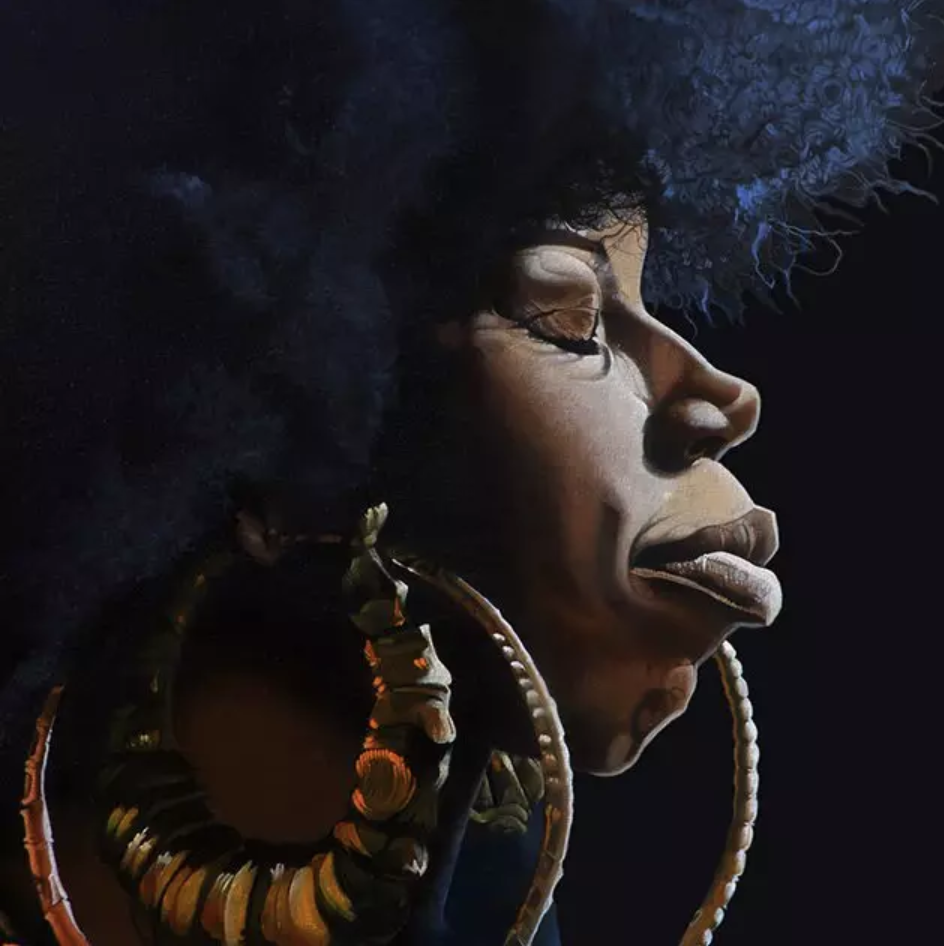Georgia Anne Muldrow ‘Overload’
Another worthy entry into the catalog of a truly gifted musician.

Score: 7.5/10
Discovering Georgia Anne Muldrow is an exciting thing. Whether you witnessed her emergent LP Olesi: Fragments Of An Earth, released when she was 22 in 2006, or heard her name dropped by any of the countless artists who have endorsed and collaborated with her over the past decade, happening upon a musician with such infectious musical charisma is enough to make the spine tingle.
That charisma—that intangible artistic allure—has endeared Muldrow to the likes of Mos Def, Robert Glasper, Madlib, Bilal and, of course, Erykah Badu. The latter link is a pertinent one; since Muldrow’s ear-pricking contribution to 2008 New Amerykah track “Master Teacher,” Badu has felt like a spiritual precursor, a mentor even, to Muldrow. Like Holly to Lennon, West to Pusha or Prodigy to Pendulum, the Queen of neo-soul is not simply an influence on Muldrow, but the architect of the sonic infrastructure she inhabits. It is worth noting, however, that although Baduizm predates Olesi by nine years, Muldrow’s tally of studio albums has long since outstripped that of Badu, and now sits at a staggering 16.
Muldrow’s prolific career has seen her try on generic guises like hats, each of which she invariably pulls off like it was designed for her, in a way only the most musically charismatic can. She has rapped, produced, and sung across albums variously exploring jazz, soul, funk, reggae, and hip-hop. Overload, her first appearance on Brainfeeder, is by and large a pop album. Label boss Flying Lotus is credited as an “executive producer” (though his name doesn’t appear in the prod credits for any particular song), but more obvious than his imprint is that of Aloe Blacc, a pop songwriter supremo whose catchy pauperism might have reached your airways around the economic downturn of 2010.
Apart from having—we assume—recovered from the recession, Blacc has also lent his compositional capabilities to Avicii, the FIFA World Cup, Owl City, Pitch Perfect 3, Adam Levine’s team on Season 6 of The Voice, and Wrestlemania. Decide for yourself if you consider the musical output of those organisations to be, you know, rubbish, but it’s clear that Blacc has an ear for an earworm, and that he has been brought in on Overload for that reason.
On the title track, Muldrow’s catchiest song to date, the decision is more than vindicated. “Overload” is a trappy, neo-soulful radio jam (should that be Spotify jam these days?) that’s impossible not to enjoy when it’s playing and impossible to get out your head once it’s over. The trick is repeated on second single “Aerosol.” Producer Dutchman Moods does what any thinking knob-twiddler should do on a Muldrow track which is to draw all attention to the singer’s magnetic voice. Layers to the lead and backing tracks harmonize like different instruments in an orchestra, lending infinite depth to every warbled lyric.
One reservation about “Aerosol”—though perhaps a harsh one—is its two-minute runtime. Of course, there’s only so much the average Spotifier can tolerate before skipping and moving on, but from the perspective of a gluttonous music fan, it might have been nice to hear the tune stretched over five or six minutes, adding in a lengthy breakdown and allowing Muldrow to stretch her vocal chords even further.
The next-biggest chorus on Overload is “Vital Transformation.” Though it’s another memorable hook, it’s the first instance of Muldrow’s vocal talents being overused, abused even. There’s a slight disappointment in hearing what was once a jazz singer, capable of the vocal acrobatics heard earlier this year on Blood Orange’s “Runnin’,” belting out vacuous, chart-friendly affirmations to the effect of “just be yourself, duuude.” It’s almost too perfect a vocal, as though assisted by auto-tune or generated by a Spotify bot. Another misuse—or at least an unfulfilling use—of Muldrow’s voice occurs on “Play It Up.” There’s a decent trap beat (some departure from Badu’s beloved boom-clack), but it’s less like T.I. and more like a cage with a bird, or Muldrow’s voice, trapped inside.
Muldrow once handled her own production, turning out infectious hip-hop cuts that would often resemble the shuffling nu-jazz of Steven Ellison (a.k.a. Brainfeeder label boss Flying Lotus.) If you’re impatient for new FlyLo material, Overload won’t constitute much of a solution, but the enigmatic Californian does shine through on occasion here. Snappy police-brutality riposte “Blam” rides atop a squirmy bassline, as does the lovely “You Can Always Count On Me.” Then there’s the beautiful, minimalist “Canadian Hillbilly,” on which Muldrow’s voice is finally afforded space to breathe inside a twilit mist, not unlike the mystical ambiance of Until The Quiet Comes.
These moments of enchantment—the glimmering metallic fill one minute into “Bobbie’s Dittie” being another—compliment Muldrow’s natural dazzle more compellingly than charty choruses ever could. As with much of her catalog, the songwriting, production, and concept are inconsistent on Overload, but all are secondary to the artist’s bewitching personality, even when pop superficiality threatens to take over. The album might not have quite enough Flying Lotus for some, and a little too much Aloe Blacc for others, but it has just enough Georgia Anne Muldrow to be another worthy entry into the catalog of a truly gifted musician.
Tracklisting
01. I.O.T.A. (Instrument Of The Ancestors)
02. Play It Up
03. Overload
04. Blam
05. Williehook (Skit)
06. Aerosol
07. Vital Transformation
08. You Can Always Count On Me feat. Shana Jenson
09. These Are The Things I Really Like About You feat. Dudley Perkins
10. Canadian Hillbilly
11. Conmigo (Reprise)
12. Bobbie’s Dittie
13. Ciao
Overload will land on October 26 via Brainfeeder.

